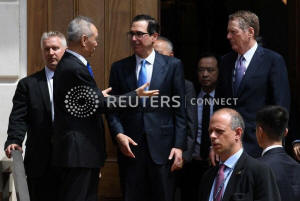China, U.S. to hold more trade talks as Trump ratchets
up tariff threat
 Send a link to a friend
Send a link to a friend
 [May 11, 2019]
By Yawen Chen and David Lawder [May 11, 2019]
By Yawen Chen and David Lawder
BEIJING/WASHINGTON (Reuters) - China and
the United States have agreed to hold more trade talks in Beijing, Vice
Premier Liu He said, as U.S. President Donald Trump ordered his trade
chief to begin the process of imposing tariffs on all remaining imports
from China.
Liu voiced a measured optimism on reaching a deal, but said there were
"issues of principle" on which China would not back down.
The United States escalated a tariff war with China on Friday by hiking
levies on $200 billion worth of Chinese goods in the midst of last-ditch
talks to rescue a trade deal. Trump issued orders for the tariff
increase, saying China "broke the deal" by reneging on earlier
commitments made during months of negotiations.
"Negotiations have not broken down," Liu, China's chief negotiator in
the talks, said, according to state television.
"Quite the opposite, I think small setbacks are normal and inevitable
during the negotiations of both countries. Looking forward, we are still
cautiously optimistic," Liu said.

China strongly opposes the latest U.S. tariff hike, and as a nation, has
to respond to that, Liu told a small group of Chinese reporters in the
video clip.
"Right now, both sides have reached mutual understanding in many things,
but frankly speaking, there are also differences. We think these
differences are significant issues of principle," Liu said. "We
absolutely cannot make concessions on such issues of principle."
He added that talks would continue in Beijing, but gave no details.
But underscoring a lack of progress in the talks, Trump ordered a
further escalation of tariffs.
Trump's move would subject about $300 billion worth of Chinese imports
to punitive tariffs, U.S. Trade Representative Robert Lighthizer said in
a statement.
Lighthizer said a final decision has not been made on the new duties,
which would come on top of an early Friday tariff rate increase, to 25%
from 10%, on $200 billion worth of Chinese imports.
CHINA DETAILS DIFFERENCES
Three differences remain between the two countries, according to China's
account of the latest talks.
One of those is over tariffs, Liu said, according to a transcript of the
Q&A published by Phoenix, a Hong Kong-based television station that is
close to Beijing. China believes that tariffs were the genesis of the
trade dispute, and that if both sides wanted to reach an agreement, then
all tariffs must be eliminated, Liu said.
[to top of second column] |

Chinese Vice Premier Liu He talks with U.S. Treasury Secretary
Steven Mnuchin and Trade Representative Robert Lighthizer as he
leaves trade talks in Washington, U.S., May 10, 2019. REUTERS/Leah
Millis

The second is about procurement, on which an initial consensus was reached
between the leaders of the two countries in Argentina late last year. The two
sides now have differing views on the volumes, Liu said. The third is over how
balanced the text of the draft agreement should be, he said.
"Every nation has its dignity, so the text ought to be balanced," Liu said.
Sources told Reuters this week that China had deleted its commitments in the
draft agreement that said it would change laws to resolve core complaints of the
United States: theft of U.S. intellectual property and trade secrets; forced
technology transfers; competition policy; access to financial services; and
currency manipulation.
Liu denied the accusations of China's reneging on promises, saying China thought
it was normal to make changes before a final deal. Both sides had differing
views on how to phrase it, he said.
Liu said he hoped this issue would be resolved, so it was unnecessary to "over
react" to that point.
Similar to Liu, Chinese state media said China would not give in on its core
interests.
"China clearly requires that the trade procurement figures should be realistic;
the text must be balanced and expressed in terms that are acceptable to the
Chinese people and do not undermine the sovereignty and dignity of the country,"
the ruling Communist Party's official People's Daily said in a commentary on
Saturday.
The trade war has weighed on the Chinese economy.
When asked about domestic concerns on how the latest tariffs could further
pressure the economy, Liu said he was optimistic about China's economy in the
longer term, adding that it had entered an up-cycle after bottoming out somewhat
last year.
He said he believed the Chinese economy would maintain a stable and healthy
trend despite some downward pressure, and that China had ample room for fiscal
and monetary policy maneuvers.

On Monday, hours after Trump said he intended to raise tariffs, the Chinese
central bank cut the amount of reserves that some small and medium-sized banks
need to hold, freeing up more funds for lending to cash-strapped firms.
(Reporting by Yawen Chen and David Lawder; Additional reporting by Ryan Woo in
Beijing; Writing by Ben Blanchard; Editing by Rosalba O'Brien and Leslie Adler)
[© 2019 Thomson Reuters. All rights
reserved.] Copyright 2019 Reuters. All rights reserved. This material may not be published,
broadcast, rewritten or redistributed.
Thompson Reuters is solely responsible for this content. |